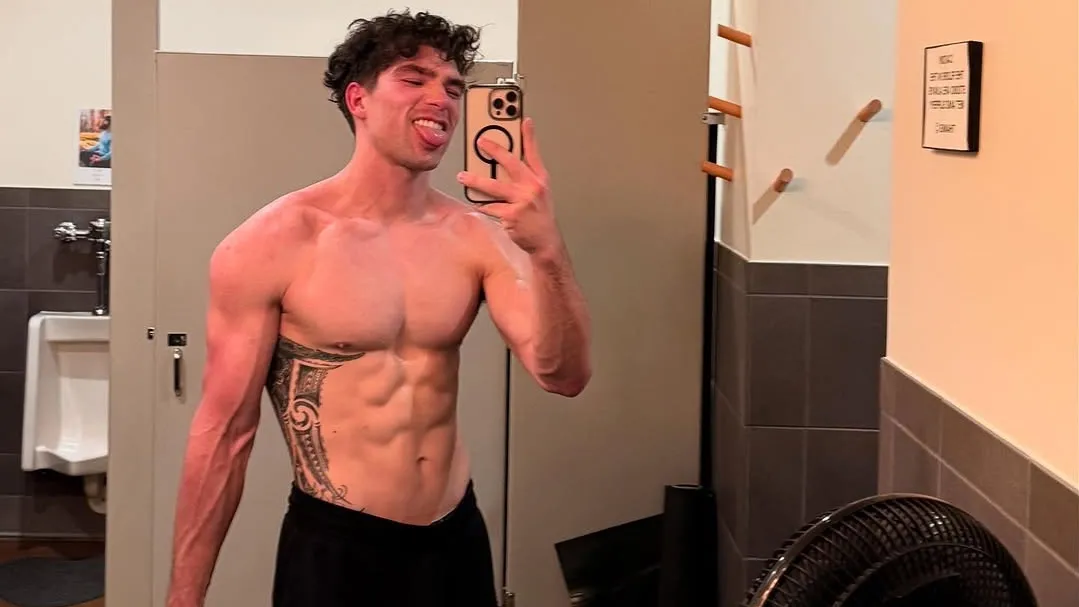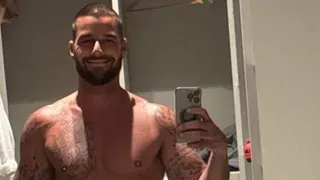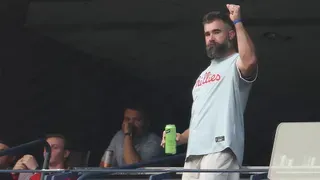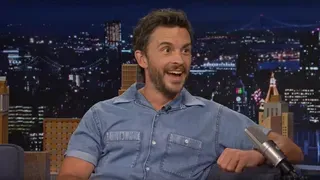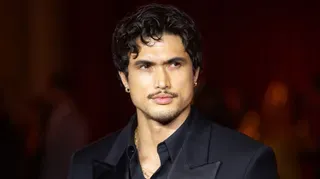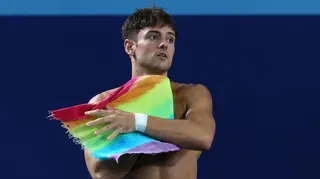April 8, 2011
The United Nations Of "Rafta, Rafta"
Kevin Mark Kline READ TIME: 10 MIN.
The term "star-studded" doesn't necessarily describe a cast of obscenely paid celebrities on a red carpet. In fact, it might better describe the tireless troupe behind the vivid characters in Jonathan Silverstein's eagerly anticipated production of Ayub Khan-Din's Rafta, Rafta...-a tale of young newlyweds who decide to live with the groom's parents to save some money. Finding that they cannot consummate the marriage behind paper-thin walls, wild comedy is wrung out of the new couple's tragic circumstances and new obstacles "pop up" left and right, while the groom's bait and tackle seems unable to do the same. The result is a witty and warmly relatable comedy about family, both blood-locked and symbolic.
The Rage Monthly had the distinct pleasure of speaking with four talented cast members from what the production team has affectionately called "The mini-United Nations:" Rachid Sabitri, a British-born New Yorker of Moroccan descent who plays Atul Dutt, the groom; Shalin Agarwal, a Miami native of Indian lineage who plays Etash Tailor, Atul's best friend; Amir Darvish, an Iranian-American who grew up in Boston and plays Jivaj Bhatt, Atul's boss; and the young Ariya Ghahramani, also of Iranian ancestry, who portrays Atul's brother, Jai Dutt.
"I'm Indian but I came out Cuban!" Laughs Shalin. "One of the things I like about this play is that it reminds me a lot of my family growing up."
This familiarity seems to be one of the major sources of attraction to this play.
"I think the success of this play is the fact that it crosses all kinds of cultures and borders," said Rachid. "I imagine that when you come and watch it, you're going to recognize a member of your family. Not to give too much away, but there's singing, dancing, fighting, accents, brown people, curry...What more could you want?"
Though Rafta, Rafta... is an adaptation of the 1963 Bill Naughton play, All in Good Time, each character is integral to the plot.
"Etash Tailor is Atul's best friend," detailed Shalin. "During this big wedding scene, he's basically giving inside information on Atul and letting everyone know what he's like. They share a love of classical Indian cinema. In All in Good Time, my character didn't even exist. Part of the struggle was to make him active and alive. Luckily, Jonathan's been really great about creating this character out of the little that's written about him. That, and I sing a classical Indian song to serenade Atul. I had to learn a lot of inflections that aren't really, uh, normal in the way we sing."
Though building a role from the ground up is a daunting task for any actor, Rafta's lead also faced challenges, not the least of which were, "...convincing myself that I've got erectile dysfunction. (laughs) Atul gets quite desperate during the play, and so his actions make him not-the-most-likeable-of-characters. What's interesting for me is trying to find this fine line of giving the audience a bit of what this guy was like before and showing that the way that he's reacting is just a byproduct of the situation-so that we can feel some sympathy for him. It's about him growing up and dealing with these adult situations. That's the biggest challenge: swaying a bit of empathy for the character, because what's written in the script is the action, not the subtext. I just kind of lucked out that the director liked the direction I wanted to go with it. So it's nice, for a change...as opposed to, 'NEXT!'"
I actually forgot, the biggest issue I've had is working with one of the members of the cast: Shalin Agarwal-he's very awkward. 'Sound more English, Shalin! You're not going to do it like THAT, are you?' (laughs)."
"He literally stops in the middle of scenes...'You're going to say it like that?' (laughs)"
"Atul has a strong regional dialect-it's quite different from the way I actually speak. All the older characters have Indian accents while the younger generation has a northwest England accent. It's like figuring out a puzzle-what drives that particular individual, what makes him tick. With good writing, you can-as an actor-bring a whole spectrum of colors to the canvas. That's exciting to me. I also like the challenges of accents, singing, physically having to change...anything that takes me away from being me. (laughs)"
These two aren't the only ones whose characters challenge them.
"One word for my character is misunderstood," admitted Amir. "Jivaj comes across as very confident, gruff, kind of the jokester whom everyone looks down upon. But that's a front. There's other stuff going on, as with any normal human being. His back-story is coming from Northern India and then moving to Bolton after losing his family and starting his life again. So really, this whole cast of characters is Jivaj's family. He came from nothing and really made a man out of himself. The difficult part was showing his vulnerability and what makes him a relatable human being. That's been a challenge because it's easy to have him be one-dimensional. It's funny, we're in previews right now. You go in thinking that you're going to get a reaction out of the audience, and it's been very different for me. I've come to the conclusion that when most people see Jivaj, they either want to punch me or f*ck me. (laughs) So it's just a matter of layering him a little bit more-maybe even make them like him a little bit too."
On the other end of the scale is Ariya's character, Jai-the one whom Ayub calls "the horny younger brother."
"He's attracted to Atul's wife...kind of a troublemaker," said Ariya. "I like him (laughs) I think he's a very fun character to play-very different from any other role I've ever played. I just finished The Kite Runner, which is a very intense drama. So to come back and do something as colorful and vibrant as Rafta, Rafta... is a very different taste."
Though it may seem as though these boys are having too much fun with what they do, their devotion and professionalism are unquestionable.
"A lot of my previous roles have been strong and confident characters who are broken on the inside," Amir elaborated. "I'm really attracted to someone who is vulnerable and weak to begin with. It takes a lot to put yourself out there, especially onstage, and be weak and vulnerable consistently. You really have to tap into certain experienced in your life and bring it out onstage."
"Obviously you want to immerse yourself in the culture and watch Bollywood films. I personally don't have an Indian accent. In the play, Jai has a Bolton (British) accent. I worked with an amazing dialect coach-Gillian Lane Plescia-who is just phenomenal. Also, the costumes really help. Especially in this play which begins at a massive wedding. When you're performing in costume, it absolutely brings it to life. I actually see a lot of similarities between Indian and Iranian culture-very close-knit, big celebrations, everybody's in each other's affairs, they want the best for their kids...and reputation is very important in both cultures."
"There's definitely a common thread between all Middle Eastern cultures. Our families can be very loud, (laughs) but at the same time very warm, affectionate and loving. There's a lot of respect within the family despite conflict...it doesn't matter where you're from. It's family."
"We had a cast member who fell ill and he had to be replaced four weeks in. He was playing my father. We became very close, we built that chemistry. Then, when a new actor came in, we had to develop that relationship all over again in a very short time. We want to make sure we know each other well and we're believable as a family. That transition was definitely the most challenging for me."
Family clearly takes center stage in Rafta, but how did a career onstage initially sound to the families of these actors? Ariya has studied drama in London and New York with great success, but... "I think my parents were weary about me becoming an actor-they pushed 'doctor' and 'lawyer' on me as soon as I came out of the womb. They were trying to convince me that being a lawyer was exactly like being an actor: you get to perform in front of the court...so it took a few years."
After seeing him perform, however, Ariya's parents began actively encouraging him.
"Now during every audition, they call me up, 'have you drunk enough water? Have you done this...done that?' ...So I've been very blessed along the way. I'm 23; I'm sort of the baby of the cast. My agent, Shirley Faison (mother of Donald Faison of Scrubs fame), signed me while I was still in school. Rafta, Rafta... was the first audition that I ever went on in New York. I went in for the part of Atul-which Rachid is playing now. I just wasn't right for it, so they had me read Jai, the younger brother. They said, 'you're very charismatic. How much do you know about Indian culture?' I said, 'Well...I saw Bombay Dreams, I enjoy Indian food and I did research!' (laughs) and I did! I just wasn't Indian, and they ended up going with an all-Indian cast. So fast-forward three or four years, I tried for Atul again, and again they said, 'Let's go with the younger brother.' So I read it and they were laughing the entire time. And here I am. I came full circle four years later!"
For Shalin, it came just as natural.
"I was the youngest in my family so I was always entertaining people-the ham of the family...but it was pretty much The Lion in The Wizard of Oz that did it for me! (laughs)"
Amir's talents were spotted at an early age as well.
"My fourth grade teacher insisted on casting me in school plays and said that this was something I had to pursue. She took me under her wing through all of elementary school and I decided to pursue it through high school and graduate school. She was my inspiration."
And Rachid entered the profession with love on the brain.
"I got into it through a crush with a girl at school back in the day. I used to walk her home. She went missing one night-it turned out she was in the school production of a show, so I decided to try out for the ensemble. The only other brown kid in the school was playing one of the leads...he broke his leg, I ended up playing one of the leads and the rest is history!"
As far as the differences between stage and film go, the actors have rather varied views.
"It's a completely different art form. The audience plays a huge role in what happens when you're performing, whereas on film it's just you and the camera and your screen partner...not taking the hundreds of crew in the background and the director. The stage is a lot more intimate-you get that immediate feedback with what you're doing. It's incomparable."
"Ultimately you're doing the same thing, right? Just getting up in front of people, dressed up as someone else, saying lines."
"I make a conscious shift between film and theatre acting. It's the same in that it all comes down to believability. But there's no doubt that when you're in front of camera, you've got to feel smaller."
"...Or when you're in front of 600 people in the audience. There are people up in the balcony. You've got to open up and use your body a bit more."
"There's absolutely nothing like performing in front of a live audience. You can literally feel the energy in the air on an opening night. It takes a different set of skills to be on stage than it does to be on camera. The little nuances and gestures-the camera will catch them whereas audiences won't. You have to make everything a little more grand. My firm belief is that if you're honest, whatever the character, you shouldn't have to worry whether it's stage or film. Audiences from both are smart and they'll be able to catch on when you're in and out of the character. Whenever people ask me whether I prefer being on film or on stage, I tell them that as actors, we just want to work in any that we possibly can! (laughs)"
Though their Rafta roles are satisfyingly challenging, the boys do have a few common favorites regarding the types of characters to play.
"I enjoy playing any character that challenges me. When I get a script and I'm terrified of it, I know it's something that I should do. I remember actors in school, if they were great at auditioning, they would take the auditioning workshop. If they were great at Shakespeare, they'd go and take the Shakespeare workshop...they would never want to take a class in something they didn't feel comfortable with. Back then, I never did any comedies. I was always the dramatic/classical actor-very intense roles. So I guess I love dramatic characters. A 20-year-old character's dialogue isn't as beautiful as a 30-year-old's dialogue. But I enjoy anything that challenges me-different cultures, different ways of life, characters with different objectives...I love to play an eclectic group of roles.
"It's work, I love it. Any medium it happens to come in, I embrace it."
"Well, the ones I LEAST like portraying are 'Terrorist #3.' (laughs)"
"For me it's 'Deli Owner.' (laughs)"
"I'd love to play a deli-owner!"
"I actually really enjoyed playing a terrorist one time. I got freakin gangsta,' dude! It was great! (laughs)"
"I've come to the conclusion I'm a rubbish terrorist."
"You're too nice! (laughs) "I'm really attracted to good writing. Whether it's comedy or drama, I like trusting the writing and letting my character go from there."
"It's been an interesting six weeks in the rehearsal process with what it feels like not being able to get it up, so to speak. (laughs)"
"I remember when 9/11 attacks happened. I wondered, 'my god, are there going to be any roles for my type at this point? Am I going to play nothing but terrorists for the rest of my life?' I just wasn't sure. I'm lucky because I'm fairer skinned. I never really wanted to change my name. I always believed that the name you're born with is what drives you and takes you through life. I didn't want to cut off my past and my family for an easier time."
For now, the boys are quite content with their roles and the certain success that each will bring to the plot, even though Shalin originally auditioned for the role that Rachid is playing now.
"He just couldn't do an English accent as good as me. (laughs)"
"And he basically came in and said, 'I have erectile dysfunction.' (laughs)"
If they're this quick offstage, I'm sure we're in for a riot of a laugh at The Old Globe.
Rafta, Rafta... continues its West Coast premiere at The Old Globe Theatre until Sunday, April 24. Go to oldglobe.org for tickets and show times.
